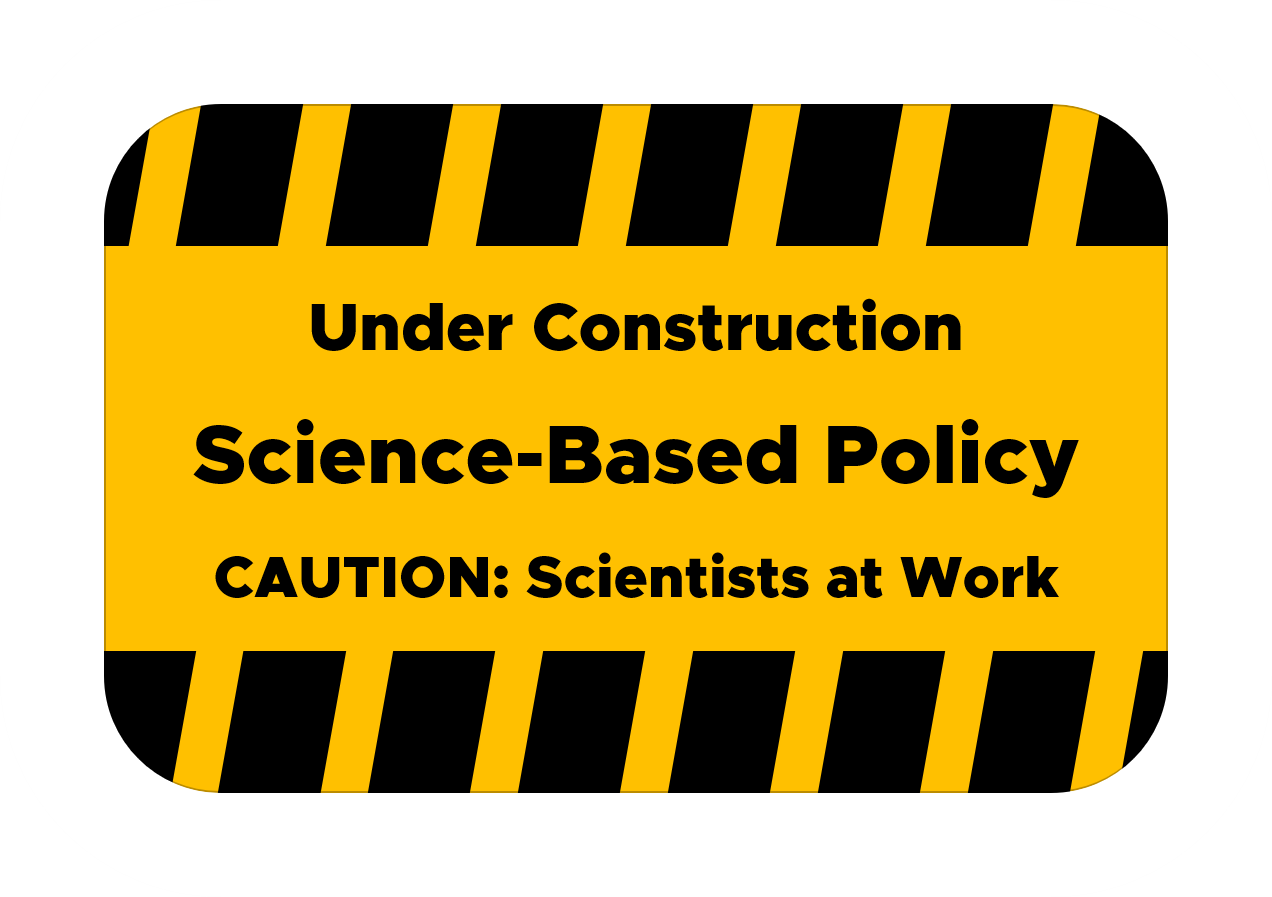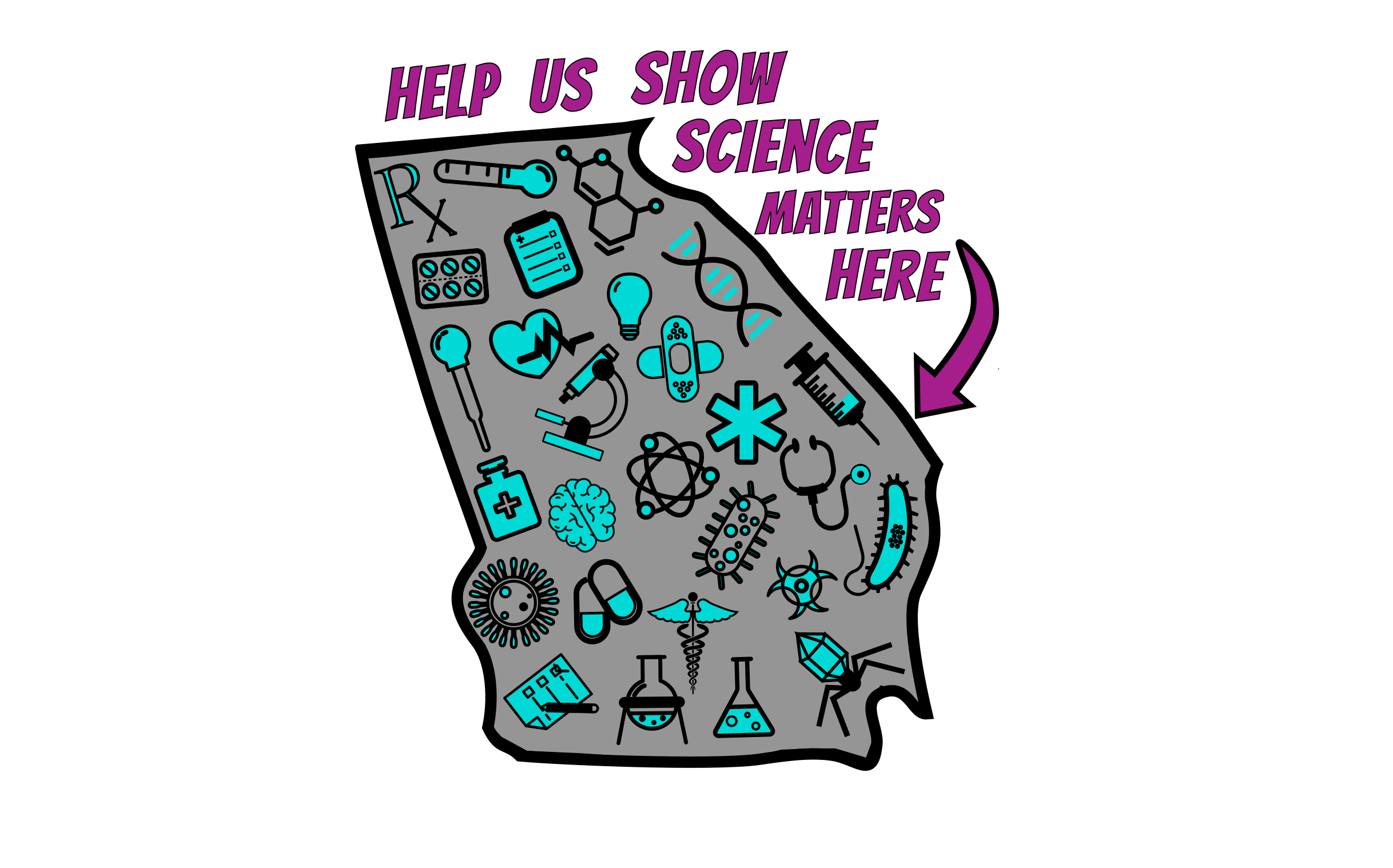January was a series of significant Wednesdays. Its hard to write anything else without mentioning…
March for Science Atlanta, 2019
Georgia scientists and supporters took to the streets to march for science on April 22nd, 2017. It was an unforgettable display of advocacy that brought in over 4,000 people. Organizers however knew the problematic culture of labeling science and facts “fake news” wouldn’t go away so they made plans to grow as an institution in order to continue advocating for science. Organizers began the process of filing for non-profit status as ‘Science for Georgia, Inc’, with a mission to “improve communication among scientists and the public, increase public engagement with science, and advocate for the responsible use of science in public policy” in Georgia. It has operated as a non-profit for a year as of March 12, 2019.
When you hear ‘Georgia’, certain imagery comes to mind: Martin Luther King, Jr., the Civil Rights movement, the backdrop for many new shows like The Walking Dead, and of course peaches. Most people don’t immediately think ‘Science hub’. However, Atlanta is home to the Centers for Disease Control and Prevention, more than twenty colleges and universities, including the top-ranked Georgia Tech and Emory Universities and the Morehouse School of Medicine, and home to STEM-focused businesses like Delta Airlines, The Weather Channel, Southern Company, and more. Unfortunately, these STEM successes have not translated to a successful relationship with science overall.
Science for Georgia plans to focus on several important issues to Georgians.
The AIDS Epidemic in Georgia
“Downtown Atlanta is as bad as Zimbabwe or Harare or Durban” says Dr. Carlos del Rio, co-director of Emory University’s Center for AIDS Research. In 2017, Georgia had the highest rates of HIV diagnoses of all states according to the CDC, with Atlanta accounting for 1,607 of Georgia’s 2,698 new diagnoses in just that year. The situation isn’t improving either. The CDC has shown that the decline in annual HIV infections has stopped.
In his State of the Union address in February 2019, President Trump promised to “eliminate the H.I.V. epidemic in the United States within 10 years” and the Department of Health and Human Services subsequently laid out a blueprint for doing so. The blueprint invokes tested strategies that are backed by subject matter experts. While we fully support this fact-based method of creating policy, questions of implementation remain. In the meantime, we will reach out to organizations like the Georgia Aids Coalition to help combat the AIDS epidemic in Georgia.
Firearms Injuries and the Anti-Science ‘Dickey Amendment’
In 1992 the CDC established the National Center for Injury Prevention and Control as the lead federal agency for injury prevention. Atlanta takes pride in being home to the CDC, but gun violence injury statistics from the CDC are not something you’ll want to put stock in. Surprising discrepancies in firearm injury data were indicated in a FiveThirtyEight analysis from October 2018… “A study published last year by the Journal of the American Medical Association (JAMA) found that compared to other leading causes of death, there has been a disproportionate lack of research on gun violence.’ Another JAMA article indicated that “language in the 1996 congressional appropriations bill likely contributed to a lack of funding for gun research.” This is in reference to the provision known as the Dickey Amendment which requires that CDC money may not be used to “advocate or promote gun control”. Former CDC leaders indicated they elected to avoid firearms research entirely rather than become the target of political retribution.
The February 2018 Federal spending bill carried a report clarifying that the CDC can, in fact, conduct research into gun violence, which is a change from previous Congressional interpretation. The Dickey Amendment itself remains however, so gun violence research is unlikely to see any meaningful improvement at the CDC. Science for Georgia will support any measure that results in restoring the quality of CDC research on firearm injury and death and simultaneously amplify local efforts to advocate for fact-based gun laws.
Climate Change and Georgia
Despite the curiously removed resources on government sites, it isn’t hard to find both how Georgia is affecting and being affected by climate change. More severe weather brings extra flooding and drought to farmland causing billions of dollars in losses, warming winters endanger our peaches, and coastal flooding impacts our coast. Georgia unfortunately is not doing enough to prevent this. For example, Georgia has signed on to faulty concepts like ‘renewable’ biomass for energy, where wood pellets are burned in place of coal. The idea is that within a few generations the trees will ‘renew’; however, the climate damage will have already been done.
Georgia shutdown one coal plant in 2019 and is looking to close more, with 15 sites remaining. If Georgia representatives and their constituents are more aware of the problem and the solution, we can see more cities pledge to switch away from fossil fuels like Atlanta has pledged to do by 2035. Science for Georgia will support already-active groups like the Georgia Climate Coalition and the Georgia Climate Project that have taken huge initiative in this space.
Science Education in Georgia
According to an article by Forbes contributor Renee Morad, Georgia public schools rank 38 out of the 50 U.S. states, using a metric based on performance, funding, safety, class size, and instructor credentials. The National Assessment of Educational Progress (NAEP) also collects data on U.S. student performance. In 2015, the percentage of students in Georgia who performed at or above the NAEP Proficient level in science was just 31 percent. While this percentage was not significantly different from the nation overall, it does indicate that Georgia public schools are in dire need of improvement. Poorly performing schools not only affect individual students, but also take a toll on society overall.
We know that it is possible to provide all children a high quality, comprehensive education, and we have a moral imperative to do so. This year, Science for Georgia is hosting the March for Science Atlanta as a fundraiser to support the Georgia Chief Science Officer program. The CSO, run by Science ATL, is a program that will galvanize our future leaders to advocate for the responsible use of science and data in public policy. For every $5k raised, an additional Georgia school can participate in the program that drives youth leadership in science. You can visit the following link to donate or, if you are unable to make a pledge, to share the campaign with friends:
https://go.rallyup.com/mfsatl2019
To learn more about Science for Georgia, March for Science Atlanta, and other exciting upcoming events, visit: https://scienceforgeorgia.org/
References:
HIV:
https://www.ajc.com/lifestyles/despite-progress-atlanta-hiv-epidemic-worse/2cjI2jI9xujrRJj5zxac2H/
https://www.cdc.gov/hiv/pdf/library/reports/surveillance/cdc-hiv-surveillance-report-2017-vol-29.pdf
https://dph.georgia.gov/sites/dph.georgia.gov/files/HIV_EPI_2017_Fact_Sheet_20190128.pdf
https://www.hhs.gov/sites/default/files/ending-the-hiv-epidemic-fact-sheet.pdf
Gun Violence:
https://www.cdc.gov/nchs/pressroom/sosmap/firearm_mortality/firearm.htm
Climate Change:
https://www.wabe.org/atlanta-adopts-plan-to-get-off-fossil-fuels-and-nuclear-by-2035/
https://www.wabe.org/georgia-power-plans-to-close-a-coal-plant-add-renewables/
https://www.bbc.com/news/science-environment-39267774
https://19january2017snapshot.epa.gov/sites/production/files/2016-09/documents/climate-change-ga.pdf
https://climateandsociety.uga.edu/climate-change/georgia-climate/
https://www.climaterealityproject.org/blog/how-does-climate-change-affect-georgia
Science Education:




